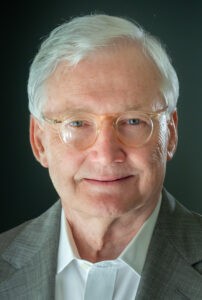In a piercingly truthful and honest op-ed in The New York Times titled “What Christian Nationalism Has Done to My State And My Faith Is A Sin,” Susan Stubson, a prominent Wyoming Republican, for whom her conservative politics and her evangelical church are important, decries what Christian nationalism has done to her political party and church.
“Christian nationalists have highjacked both my Republican Party and my faith community,” she writes. It has made her party unrecognizable to her, she says and adds, “Indeed, it is unclear to me many Sundays whether we are listening to a sermon or a stump speech.”

Stephen Shoemaker
The same dilemma faces Christians of all theological and political persuasions. How can one find center in such a time as this. The culture wars and political wars have threatened to undo us all. And they have taken on the intensity of religious wars.
What the church needs is a return to the whole gospel of God in Christ. Where might we find it? We can begin with the Hebrew prophet Micah and Jesus.
Micah summed up the commandments and the Hebrew prophets’ message with this triad: “What does the Lord require of you but to do justice and to love mercy and to walk humbly with your God?” Jesus echoed the same message to the religious leaders of his time and said, “Woe to you who tithe mint and dill and cumin and neglect the weightier matters of the law: justice and mercy and faith.”
The renewal of the American church can come as we tend to all three of these dimensions of God’s way, not just one or two of them. It’s like the proverbial three-legged stool: We need all three of them to stand.
“Justice, justice shall you pursue, says the Lord,” the passage saying the word twice for emphasis. “Let justice roll down like waters and righteousness like an ever flowing stream,” said Amos.
“When we dam up the flowing waters of justice and righteousness, the land begins to wither and die.”
When we dam up the flowing waters of justice and righteousness, the land begins to wither and die. The church is called to let the waters flow. Walter Rauschenbusch, father of the Social Gospel movement in America, said, “Nations die of legalized injustice.” Some churches make the pursuit of justice their main mission, but more is needed.
“Do justice,” Micah said, then the command, “Love mercy.” Loving mercy is the main mission of some churches. This includes being merciful to those who most need mercy and doing acts of mercy like caring for the hungry and sick and forgotten of our world.
“Love kindness” is how it is sometimes translated. In a nation that revels in cruelty, kindness is an urgent calling.
Then he adds, “Walk humbly with your God.” If we are to seek justice or love mercy, we need the leavening quality of humility. We are not God or God’s infallible agents. Justice in our hands is never pure; it is redeemed through love. Mercy is part of our mission, but it is not all we are called to do.
Justice without mercy is not true justice. And mercy without justice can turn sentimental. As the story goes, it is like pulling people out of the drowning waters at the bottom of the river without asking what is going on upstream where people are being thrown into the waters.
Walking humbly with our God is the call to the deepening spiritual life. The spiritual walk with God is the main mission of some churches, the encouragement of the spiritual life in worship, prayer and spiritual practices.
“What God requires, and what we and the world most need, are churches that nurture all three dimensions of the whole gospel of God.”
Action, apart from prayer and spirituality, can be misguided and short lived. Jesus’ own summary of the commandments was the love of God with all we are and the love of neighbor as ourselves. The heart of the mission of the church is the increase in love of God and neighbor. We dare not give this a lesser place.
We are blessed with churches who are justice churches, peace churches and mercy churches — and churches primarily devoted to the spiritual life. The specificity of their mission is a witness to a lost or neglected part of what it means to be the church.
However, the urgent need of most churches today, and the church’s path of renewal, is to care deeply about all three dimensions of being the church. Such is the wisdom of Ecclesiastes that a threefold cord is not easily broken.
What God requires, and what we and the world most need, are churches that nurture all three dimensions of the whole gospel of God.
Jesus means justice, yes, and freedom and peace and joy and healing and mercy and reconciliation. And in his Spirit we can begin to weave them all together.
If each local church would take all three with the seriousness of Micah and Jesus, we could begin carving a way out of the present wilderness. This is the center that holds.
Stephen Shoemaker serves as pastor of Grace Baptist Church in Statesville, N.C. He served previously as pastor of Myers Park Baptist in Charlotte, N.C.; Broadway Baptist in Fort Worth, Texas, and Crescent Hill Baptist in Louisville, Ky.
Related articles:
Hope in time of panic | Opinion by Stephen Shoemaker
The church in America needs to recover its balance | Opinion by Stephen Shoemaker


